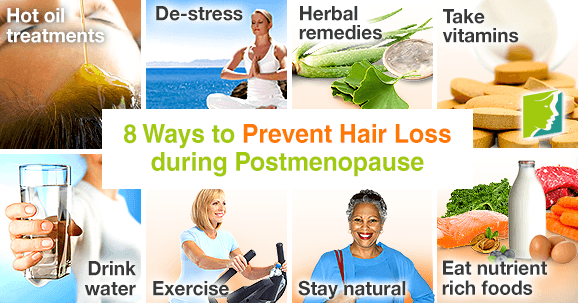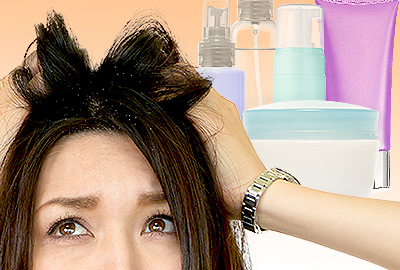Hair loss during postmenopause is a common occurrence that affects millions of women every day. In fact, thinning hair and hair loss occurs in about 50% of women by the age of 50. Postmenopause is the stage of a woman's life when menstruation has fully stopped, which occurs one year after their last menstrual period. The average age in which postmenopause occurs is 51; however, it varies depending on genetics and lifestyle. There are many causes of hair loss during postmenopause, and this articles provides helpful ways to prevent hair loss during postmenopause.
Prevention Methods
Hot oil treatments
Natural oils - like coconut, olive and jojoba - work best for this treatment. After heating up the oil (only until warm, never hot), gently massage it into your scalp, put on a shower cap and leave it in for an hour, then shampoo and rinse. This treatment helps reduce stress and prevent stress-induced hair loss.
De-stress
Stress is one of the leading causes of hair loss, so it is vital to manage and reduce stress as much as possible. Relaxation methods like yoga and meditation can help reduce stress. Reading, listening to calming music, and taking a leisurely walk are also useful methods to help reduce stress.
Herbal remedies
Ginkgo, aloe vera, and rosemary are all beneficial herbal remedies for nourishing the scalp and hair follicles and preventing loss. These herbs also help stimulate circulation, which promotes hair growth.
Take vitamins
Vitamin deficiencies can also cause hair loss, but taking vitamin supplements is an efficient way to prevent this. Vitamins B, C, and E are all essential vitamins for hair loss. These vitamins work to protect the hair and scalp while restoring shine and strength to hair. You can find these vitamins in tablet form at any nutrition shop or health food store.
Drink water
Staying hydrated is vital for promoting natural hair growth and keeping it healthy and beautiful. Drinking water offers other benefits to the body, such as regulating digestion and reducing headaches and anxiety.
Exercise
Exercising is a key part of a healthy lifestyle. Exercising offers numerous health benefits: it reduces stress levels by releasing feel-good endorphins, promotes bone and muscle health, and helps maintain hormone balance.
Stay natural
Avoiding harsh styling including dyes, chemical treatments, and hot tools is one of the best things you can do for your hair. These styling treatments accelerate hair breakage and hair loss.
Eat nutrient-rich foods
Eating foods that are rich in protein, vitamins, and essential fatty acids will help promote hair health. Protein works to strengthen hair and promote growth. Red meat, dairy, and eggs are all protein-rich foods. Other nutrient-packed foods that promote hair health are salmon, almonds, blueberries, guava, sweet potatoes, carrots, whole grains, spinach, kale, and broccoli.
Hair loss is a natural part of aging. Hormone fluctuations experienced during postmenopause is the main cause of hair loss. There are ways to help prevent hair loss by strengthening the hair and stimulating hair growth. These include reducing stress, eating nutrient-rich foods, and exercising. All of these prevention tips are natural, relatively inexpensive, and easy to do at home. Read complete information on menopausal hair loss treatments.
Sources
- Bhat, G. , Kudva, P. & Dodwad, V. (2011). Aloe vera: Nature's soothing healer to periodontal disease. Journal of Indian Society of Periodontology, 15(3), 205-209. doi: 10.4103/0972-124X.85661
- Kobayashi, N. et al. (1993). [Effect of leaves of Ginkgo biloba on hair regrowth in C3H strain mice]. Yakugaku Zasshi, 113(10), 718-724. Retrieved from http://www.ncbi.nlm.nih.gov/pubmed/8254481
- Murata, K. et al. (2013). Promotion of hair growth by Rosmarinus officinalis leaf extract. Phytotherapy research, 27(2), 212-217. doi: 10.1002/ptr.4712
- National Institutes of Health. (2014). Hair Loss. Retrieved November 24, 2014, from http://www.nlm.nih.gov/medlineplus/hairloss.html
- Office on Women's Health. (2008). Skin and Hair Health. In: The Healthy Woman: A Complete Guide for All Ages. Retrieved from http://www.womenshealth.gov/publications/our-publications/the-healthy-woman/skin_hair.pdf
- Riedel-Baima, B. & Riedel, A. (2008). Female pattern baldness may be triggered by low oestrogen to androgen ratio. Endocrine regulations, 42(1), 13-16. Retrieved from http://www.ncbi.nlm.nih.gov/pubmed/18333699




